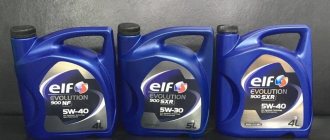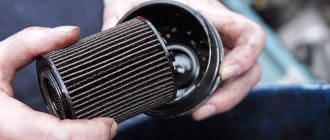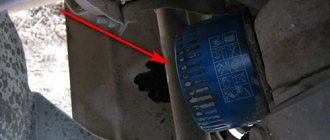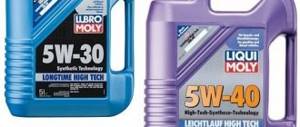Many motorists, having chosen a certain manufacturer of lubricants for the engine, remain faithful to it for the remaining time. The exception may be rare cases in which they bought a low-quality product. But both companies are good, so we’ll try to figure out which oil is better, Shell or Mobile.
Requirements for motor oils
Among the tasks performed by lubricants, the most important are:
- Cooling – during engine operation, all its parts become very hot, the oil ensures their cooling, to a temperature at which steel hardening processes are not observed;
- Anti-corrosion qualities - most engine parts are made of metals prone to rust; while in lubricant, they are protected from contact with the environment by a thin film of oil;
- Friction resistance - the moving parts of the engine continuously move during operation, due to friction their surface is actuated, the oil slows down the production process.
To understand which Shell or Mobile oil is best for your car, you should understand how engine lubricants are classified. They are distinguished by composition:
- Mineral oils are a product obtained by primary (selective) purification of lubricating material from paraffins;
- Mineral oils with improved characteristics - after hydrotreatment, the quality of the lubricant increases, they have a minimal level of contamination;
- Extra viscous lubricants are a large subgroup of oils that are obtained through the process of catalytic hydrocracking. They can be found both in the Shell and Mobile lines, and are mineral, synthetic and semi-synthetic;
- Oxidation-stable lubricants - such oils are characterized by the absence of harmful impurities and also have good viscosity;
- GTL oils are the highest quality product for engine lubrication; Mobile Corporation does not yet have oils of this level in its line of engine products, but Shell does.
In addition to the listed differences, Shell and Mobile lubricants are available for both gasoline and diesel engines, and there are products equally suitable for any engine.
When purchasing motor oil, you should pay attention to its kinetic viscosity; products with a more viscous structure are suitable for use in the summer. Each type of motor lubricant contains a certain amount of various additives that improve properties, usually it does not exceed 20%.
Recently, synthetic lubricants have become the most popular, as they consist of chemical elements and have the best performance characteristics.
Which motor oils do car owners choose - Shell or Mobil?
In November 2020, according to PartReview, Mobil motor oils topped more auto ratings than Shell:
Mobil is chosen by owners of such cars as: BMW X5, Chevrolet Aveo, Ford Focus, Honda Civic, Hyundai Elantra, Infiniti FX, Opel Astra, Mazda Capella, Nissan X-Trail, Subaru Forester, Toyota Chaser, Toyota Corsa, Toyota FunCargo, Toyota Hilux Surf, Volkswagen Bora, and others.
Shell is chosen by owners of such cars as: Daewoo Matiz, Great Wall Hover, UAZ Patriot, Daewoo Lanos (Sens), Nissan Bluebird, Skoda Yeti, Toyota Corolla Fielder, Toyota Gaia, Toyota Tercel, Toyota Vista, VAZ (Lada) Priora, and others .
Chemical characteristics of Shell and Mobile
When analyzing the chemical composition of motor oil, first of all, pay attention to the base number, which is determined by the variety of additives used. Their calculated amount is included in the product composition and is expressed in milligrams per kilogram of oil.
The additives contain ions of such chemical elements as:
- Zinc;
- Boron;
- Calcium;
- Phosphorus;
- Magnesium.
Mobile motor lubricant contains the largest number of calcium ions among its competitors, their level is 2000 mg/kg. Although Castrol products also equate the stated presence of calcium ions to this level. For Shell, this figure is more modest and does not exceed 1355 mg/kg. The ratio of other filler elements is approximately comparable, with a slight advantage for Mobile. However, Shell oils are twice as high as their analogues in terms of the amount of barium in their composition, its content is approximately 15 mg/kg.
According to a general assessment of the chemical composition, the alkaline number in Mobile oil is significantly higher than that of competitors from Shell or ZIK:
- Mobile – 9.5 mg KOH/g;
- Shell – 5.4 mg KOH/g.
In addition to the fact that Mobile is ahead of Shell in terms of the number of basic additive elements, this company’s products contain molybdenum, which significantly improves the functionality of motor lubricants. Its main purpose is to protect working units from wear due to friction. During operation, molybdenum particles penetrate into the microcracks that form; this metal has high strength properties and prolongs the operation of parts. Its content in Mobil products is equal to 150 mg/kg.
Although the advantage in the chemical composition of additives is significant, it only indirectly affects the overall performance of the engine; Shell oils demonstrated the same high performance as Mobile on test benches. The difference is only observed on parts made of soft metals such as aluminum. However, Shell oil was several points ahead of its competitors when tested on steel engines.
Which motor oils are more popular - Shell or Mobil?
In November 2020, on PartReview, Shell motor oils were generally more popular than Mobil.
In terms of votes, Shell motor oils outperformed Mobil:
- For Shell, the ratio of positive votes (729) to negative votes (222) was 507 votes.
- For Mobil, the ratio of positive votes (644) to negative votes (176) was 468 votes.
In terms of the number of reviews, Shell motor oils surpassed Mobil:
- There are 296 reviews written for Shell motor oils: 211 positive, 42 neutral, 43 negative.
- There are 256 reviews written on Mobil motor oils: 188 positive, 35 neutral, 33 negative.
Behavior of lubricants at low temperatures
Tests were carried out at a minimum ambient temperature of -30 degrees Celsius, they did not reveal any significant differences between Shell and Mobile products, the oils showed excellent results, and the cars started within 2-3 seconds.
Shell lubricants dominated among competitors in tests at elevated temperatures, having greater kinetic viscosity, they retained their declared properties when the engine was running.
Assortment of oils "Liqui Moly"
As of the beginning of 2020, Liqui Moly’s range of motor oils includes 33 varieties. This allows selection to be made for any internal combustion engine currently in use. The entire catalog of these Liqui Moly products can be divided into three parts:
- special;
- universal;
- branded.
And each of them is divided into several lines.
There is another type of oil - top-up oil, currently it includes only one such brand - HC-synthetic motor oil Nachfull Oil 5W-40, and is sold in a 1-liter canister. This composition can be used to add oil to the required level in the crankcase if it is not known what type and brand of oil is currently poured into the engine. Since Nachfull Oil is compatible with any motor oil.
Special oils
In turn, special ones are divided into two lines - TOP TEC and SPECIAL TEC. They are made using NS-synthetic technology. A distinctive feature of the TOP TEC is the fact that the oils are low-ash, that is, designed for “eco-friendly” engines and high-quality fuel (low sulfur content). Despite the fact that they are made using hydrocracking technology, they still have a reduced sulfate ash content. Suitable for any, even the most modern, engines.
The TOP TEK line first appeared on sale in 2004. The first product was oil 4100, “tailored” to the requirements of Mercedes. After that, 4200 were produced - for the brands Volkswagen, AUDI and other brands belonging to the VAG concern. Brand 4300 is designed for the “Japanese” Honda and Toyota, as well as some European cars. Brand 4400 - for Renault with particulate filters. Brand 4500 - for Ford, Mitsubishi, Mazda. Well, brand 4600 is intended for cars produced under the supervision of the General Motors concern, in particular, Opel and all Korean cars. Although currently each listed series has approvals from different automakers. You will find the relevant information on the canister label or in the online store description.
The listed brands have the following viscosities:
- 4100 5w-40. The article number of the 4-liter canister is 7547.
- 4200 longlife III 5w-30. The article number of similar containers is 3715.
- 4300 5w-30. Article number 5 liters - 8031.
- 4400 5w-30. Art. nom. similar canisters - 2322.
- 4500 5w-30. The article number for a similar canister is 2318.
- 4600 5w-30. The number for purchasing a 5 liter canister is 8033.
It is interesting that TOP TEK series oils are excellent for Russian fuel, which is not always of high quality, which may contain large amounts of sulfur or other harmful impurities. They can be used in almost any engine, including boosted engines and diesel engines with direct fuel injection, the Common Rail system, complex exhaust gas purification systems, and so on. They help save fuel, extend engine life, withstand high engine speeds and loads, and extend the life of the catalyst.
SPECIAL TEC series is also made using NS-synthetic technology. It is a “simplified” version of TOP TEC. Thus, they have registered approvals from individual automakers, but are no longer low-ash and have no environmental restrictions. Therefore, they are more suitable for domestic cars and domestic fuel.
Asia America 5W-30
Sold in gray canisters. As for tolerances, 0W-30 oil has Volvo approval, 5W-30 oil has approvals for Ford and cars from the General Motors concern. Standing a little apart in this series are the notorious oils called “Asia-America” , intended for new and used (3 years and older) cars from Asian countries and the USA, used in the domestic markets of these countries. Oils are available in four viscosities according to the SAE standard - 0W-20, 5W-20, 5W-30 and 10W-30. These four types of oils are made according to the well-known ILSAC standard. According to the European standard ACEA has class C5.
Oils with viscosity 0W-20 and 5W-20 are intended for Honda cars, as well as American cars with a large engine capacity (up to 4...5 liters). As for lubricating fluid with a viscosity of 5W-30, it is essentially universal and can be used in any Japanese and American cars, if allowed by their manufacturer. Oil with a viscosity of 10W-30 is intended for used Asian and American cars.
Article numbers of Liquid Moly oils from the Special Tech series:
- AA 0w-20. The 4-liter canister has the article number 8066.
- V 0w-30. The 5 liter canister has the article number - 2853.
- F 5w-30. A similar canister has the article number - 8064.
Universal oils
As for universal ones, they are presented in three lines - LIQUI MOLY OPTIMAL, LEICHTLAUF, SYNTHOIL.
Optimal series belongs to the middle price range, but the oils themselves are more premium. They are presented as HC-synthetic oils (with viscosities 5W-30 and 5W-40) and semi-synthetic (with viscosity 10W-40, including those specifically for diesel engines). It offers good value for money. It is noted that it is excellent for the Russian market. There are synthetic and semi-synthetic compounds.
There are oils with the following viscosities:
- Synth 5w-30. The 4-liter canister has the article number - 39001.
- Synth 5w-40. A similar canister has the article number - 3926.
- Semi synth 10w-40. A 4-liter canister is sold under the number - 3930.
- Diesel 10w-40. The article number for the four-liter canister is 3934.
LEICHTLAUF line literally translates as “easy running oils”. They are synthetic on a hydrocracked (HC) basis. They are considered premium oils offered at affordable prices. Meet the highest API and ACEA requirements (in particular, Leichtlauf High Tech LL 5W-30 complies with ACEA A3/B4, API SL/CF).
The line includes the following viscosities:
- Super 10w-40. The article number for the five-liter canister is 1929.
- Leichtlauf 10w-40. The 4-liter canister has the article number - 1318.
- Special AA 10w-30. The 4-liter canister has the article number 7524.
- Special AA 5w-20. The article number for the four-liter canister is 7621.
- Special AA 5w-30. The 4-liter canister has the article number - 7516.
- Special 5w-30. The article number for a 5 liter canister is 1164.
- Special LL 5w-30. The 4-liter canister has the article number - 7654.
- High-tech 5w-40. The article number for a 4-liter canister is 2595.
- Diesel 10w-40. The article number for the five-liter canister is 8034.
Oils in the SYNTHOIL are fully synthetic (PAO). They can be used in the most modern engines. Depending on the specific brand, they are suitable for multi-valve engines, for engines with particulate filters, with modern exhaust cleaning systems, and so on. Some of the highest quality, but also expensive oils.
Here the catalog of Liqui Moly Synthetics brand oil presents the following assortment:
- Diesel synthoil 5w-40. The article number of the popular 5 liter canister is 1927.
- Energy 0w-40. The canister has a volume of 4 liters, its article number is 7536.
- High Tech 5w-40. The volume of the canister is 4 liters, its article number is 1915.
- High Tech 5w-50. The 4-liter canister has the article number - 9067.
- Race Tech GT 10w-60. The volume of the canister is 5 liters, the article number is 1944.
- Longtime 0w-30. The 5 liter canister has the article number - 8977.
Branded oils
As for branded antifriction oils, they are represented by two lines - MOS2 LEICHTLAUF and LIQUI MOLY MOLYGEN New Generation . The latter in 2013 replaced the previously known line of Liquid Moly Moligen. The new oils are made on the basis of a tungsten-molybdenum additive that implements Molecular Friction Control technology - molecular friction control. Development of the additive lasted almost five years! LIQUI MOLY MOLYGEN New Generation is HC-synthetic oils, and MOS2 LEICHTLAUF is semi-synthetic.
As for the new generation LIQUI MOLY MOLYGEN oils, the specified tungsten-molybdenum additive perfectly reduces friction between engine parts. Each product is designed for specific car brands. Thus, oil with a viscosity of 5W-30 is intended for Japanese and American cars. 5W-40 - more suitable for the European market. 10W-40 - for the premium segment for light commercial vehicles (vans, minibuses).
Viscosities and articles of the “Liqui Moly Moligen” series in popular trade volumes (4 l.):
- 5w-30 - 9042.
- 5w-40—9054.
- 10w-40 - 9060.
The MOS2 LEICHTLAUF series are motor oils for older generation cars. Can be used under severe engine operating conditions. Suitable for gasoline and diesel engines, including those with a turbine.
Articles of 4-liter canisters of the molybdenum series for easy work:
- 15w-40— 1949.
- 10w-40 - 1917.
Temperature tests carried out by the initiative group in cold weather of -20 degrees Celsius showed that almost all original Liqui Moly oils with dynamic viscosity from 0W to 10W have good fluidity, so they can be used in winter.
Oil burnout
The waste consumption is determined for each oil in the product line separately. There are acceptable parameters for this indicator, but the lower the consumption, the more economical the lubricant is considered. Shell oils in this component are inferior to the Mobile line, the difference in savings is about 3%. However, this difference is not so significant as to give preference to one of the products based on this parameter.
Mobile's average consumption is 11.32 ml per 100 km, while Shell's is 11.39 ml per 10 km.
What's the result?
As you can see, ZIC oil cannot in any way be considered a bad product, but it would be a mistake to believe that it will be better than expensive analogues from the famous Shell, Mobil or Liqui Moly. In other words, as practice shows, such a product can be safely rated a solid four, but nothing more.
Experienced drivers and large sellers constantly emphasize that it is necessary to buy ZIC oil only at official points of sale. It was also noticed that a lot of counterfeit and non-original products are sold in the markets in small quantities.
At the same time, non-original oil is usually found in plastic containers, while among ZIC in a tin can, counterfeit oil is also found, but much less frequently. For this reason, it is important to know how to distinguish real motor oil from a fake.
Engine oil viscosity, what is the difference between oils with a viscosity index of 5w40 and 5w30. Which lubricant is best to pour into the engine in winter and summer, tips and recommendations.
How to choose the right engine oil for an old internal combustion engine or an engine with a mileage of more than 150-200 thousand km. What you need to pay attention to, useful tips.
How to choose the right motor oil for your car engine. Oil base of the lubricant, marking and classification according to SAE, API and ACEA. Useful tips.
What is better to use: synthetic or semi-synthetic oil. When is it optimal to fill the engine with synthetics and in what cases is it a semi-synthetic product?
When should you change winter oil to summer oil? What summer oil is best to use? What you need to know about tolerances and oil viscosity so as not to harm the engine.
Brand awareness
Many car enthusiasts are not particularly versed in the intricacies of working at different temperatures or the chemical composition of oil, but prefer to choose a product that is well-known and has positive reviews among friends and experts. Both companies have deep historical roots and are well established in markets around the world.
Mobile is a North American corporation that has been in the lubricants market for 125 years. Over the years of its existence, it has absorbed several companies with less capital, and in 1999 it merged with the English giant Exxon. Today, sales volumes of this company's products rank second in America and are among the top five world leaders;
Shell is the largest corporation engaged in the production of automotive lubricants of various types, it was founded in the UK and the Netherlands, sales volumes confidently hold the first place in the world. Shell was created back in 1907.
To summarize, we can say that both companies producing motor oils are worthy of respect and produce high-quality products; focus on the fact that Mobile lubricants have a better chemical composition and their consumption is slightly lower. Among the advantages of Shell are good engine protection in hot weather and the presence of GTL oil in the product line.
Criteria for choosing engine oil
If a motorist does not know what to rely on when choosing a lubricant, he should, first of all, turn his attention to a product from a foreign manufacturer. As a rule, all motor fluids can be classified. The substances differ from each other in composition; you can buy mineral lubricants in stores, which are considered basic (they are created by selective purification by removing paraffins using a solvent); minerals that have been subjected to hydroprocessing; as well as lubricants that have the highest degree of viscosity.
Motor fluids that have the highest level of oxidative stability, as a rule, have excellent viscosity and do not contain paraffins. This class includes exclusively basic synthetic fluids without harmful impurities of sulfur and metals.
Manufacturers also create synthetic lubricants that are based on plant extracts. Such substances have a high level of resistance to the outer oil film. Their main advantage is considered to be the ability to flush the power unit, showing good thermal and antioxidant functions. It is believed that the best oil that exists today is a lubricant created using GTL technology. This substance is produced exclusively by Shell, where this lubricant is called Pennzoil.











